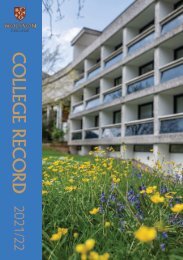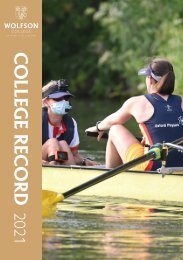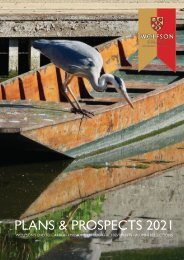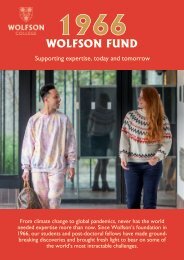Create successful ePaper yourself
Turn your PDF publications into a flip-book with our unique Google optimized e-Paper software.
a little shelter on the beach and then would start picking up plastic. There were set categories.<br />
One of us would be picking up flip-flops, a second plastic bottles or fishing gear, and the third<br />
was picking up miscellaneous items. On other days we’d just put everything in sacks and sort<br />
through it later, when it was too hot to be on the beach. Around nine o’clock it would get<br />
so hot that all the giant tortoises would disappear for shelter. From 11:30 to 14:30 the heat<br />
would get so intense it was hard to keep working. Imagine tropical temperatures, high humidity,<br />
no shade, the sand heating up, and your carrying heavy sacks full of plastic. It was like being in<br />
an oven. If we were close to our base, we would go back around noon, make some lunch and<br />
try to relax. Some people would sleep, but I found it too hot because my bunk was just underneath<br />
the corrugated iron roof. The heat would usually break around two, so we’d go and pick<br />
up plastic for another four hours. After that, we’d go back to base, cook dinner and get ready<br />
for the next day. Some nights we had to take baby turtles back to the sea, because our lights<br />
would accidentally attract them to our camp.<br />
During the second phase, I was part of a team of three that supported Sky News as they<br />
filmed a documentary for the Aldabra Clean Up Project. It meant helping the crew, setting up<br />
tents, cleaning up the nearby beaches, both on and off camera. We all were interviewed by Sky<br />
live on air.The other nine volunteers were moving the plastic we’d picked up along the coastline<br />
to central pick-up points on key beaches, helped by the Seychelles Coast Guard.<br />
FEATURES<br />
The final stage was getting all the plastic onto boats, which was where the Seychelles Coast<br />
Guard really helped: they had much more training and experience in dealing with big waves<br />
and boats in challenging situations. And there were a lot of them: an extra thirty people makes<br />
a huge difference. We would be sprinting up and down the beach dragging the plastic to them.<br />
It was like interval training, really. We had to be very quick, but the skippers knew what they<br />
were doing. So that was that; you’d finish a beach, go on to the next one, wait until the waves<br />
were right and start the process all over again.’<br />
What happened with the plastic after putting it on the boats?<br />
‘The 25 tonnes of plastic we cleared was put on containerships, which went back to Mahé to<br />
be stored in a warehouse there. The reason we separated the plastic into those different categories<br />
was because, before the project started, certain people and organisations were asked if<br />
they would be able to do anything with it when collected. A chunk of it was taken away to be<br />
used for educational outreach and art projects. The aim is to send PET plastics to a PET<br />
recycling factory on Mahé. Environmental charities were contacted to see if they could repurpose<br />
the fishing gear, for ships that want to fish in a sustainable way. But it has been a bit unclear<br />
what is happening to the rest of it. One of the problems is that recycling plastic is actually<br />
very difficult. Once it has been in the ocean and has started to break down, my understanding<br />
is that it can be almost impossible to recycle it. It’s much better for the plastic to be stored in a<br />
warehouse in Mahé than floating in the ocean, but we must decide what we want to do with<br />
it. Fortunately, there are a lot of conversations happening internationally, asking similar questions,<br />
now that the oceans are polluted. Even if you get the plastic out of the oceans, where<br />
does it go? It’s an ongoing issue, but at least people are talking about it.’<br />
28<br />
COLLEGE RECORD <strong>2019</strong>
















